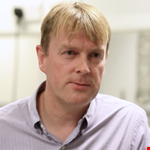The COVID-19 pandemic has exacerbated the problem of plastics in the environment, impacting on waste management across the UK, EU and globally. We have seen increased demand for single use plastics for public health purposes, disruptions to the usual distribution pathways and variations in reuse, recycle and retention which are all vital to developing a circular economy. As countries begin to ease lockdown restrictions it is likely that citizens will face greater pressures in managing their waste with potentially more home based working, less travel and socialising and increased single use plastic packaging (e.g. medical equipment, customer avoidance of 'loose' retail products).
This transformative project will have the effect to reduce inappropriate plastics disposal and increase recycling rates by increasing the monetary value of the recycled material. This will address the Plastics Pacts objective of 30% recycled content by finalising the underpinning luminescent labelling technology to be implemented. Implementation of this technology into the NextlooPP process will facilitate the availability of rPP granules for food, cosmetics and lower grade applications thus reducing the demand for virgin polymer.
View on YouTube
Tackling the systemic problem of plastic waste effectively cannot be achieved through purely technical means and our research offers fresh insights into people's perspectives on recycling and how consumers (UK, Spain, Germany) engage with surface markers on plastic packaging in their households, a neglected but important site for managing waste. This project thus moves beyond the technical infrastructure of waste management and design of products to address people's perceptions and behaviour with plastic packaging in their every day life and how their perceptions and behaviour might have changed in light of COVID-19.This ambitious project will thus help position the UK at the forefront of innovation in sorting hard to recycle plastics and offers fresh insights by integrating technical, business, policy and consumer focused elements to ensure that we are in alignment with stake holders all across the plastic packaging supply chain.
Meet the Principal Investigator(s) for the project

Dr George Fern - George Fern is a chemist by background who has worked in engineering since 2006. He has a broad skills set in developing and delivering collaborative research and development projects and consultancy with industry, from inorganic and organic materials chemistry to their integration into polymeric materials and electronic devices and has acted as an expert witness. His research focus is on polymer procesing, sustainable materials and opto-electronic materials and devices for applications ranging from horticulture to displays and lighting.
He has teaching interests in chemistry, materials chemistry and charasterisation.
He has a keen interest in materials characterisation, electron microscopy (SEM, TEM), X-ray methods (XRD, XRF) and spectroscopic techniquies (UV-Vis-NIR, FTIR, Raman) to study luminescent materials (cathodoluminescence (CL), photoluminescence emission and excitation (PL, PLE)) and is the Director of the Wolfson Centre for Sustainable Materials Processing and Characterisation.
He is a Chartered Chemist and Member of the Royal Society of Chemistry, a Fellow of the Higher Education Academy and a Fellow of the Royal Microscopical Society.
Related Research Group(s)
Sensors and Instrumentation - Research in detectors, instrumentation, and data analysis methods applied in high energy particle physics, space science, medical imaging, and remote instrumentation and control.
Experimental Techniques Centre - A highly regarded cross-disciplinary characterisation facility, with specialist staff that have expertise from various scientific disciplines, e.g. biology, metallurgy, geology and engineering.
Wolfson Centre for Sustainable Materials Development and Processing - Research into the development and processing of new materials including nano-materials, nano-phosphors and nanostructured carbon, biofuels, polymers and bio-polymers.
Partnering with confidence
Organisations interested in our research can partner with us with confidence backed by an external and independent benchmark: The Knowledge Exchange Framework. Read more.
Project last modified 13/10/2023